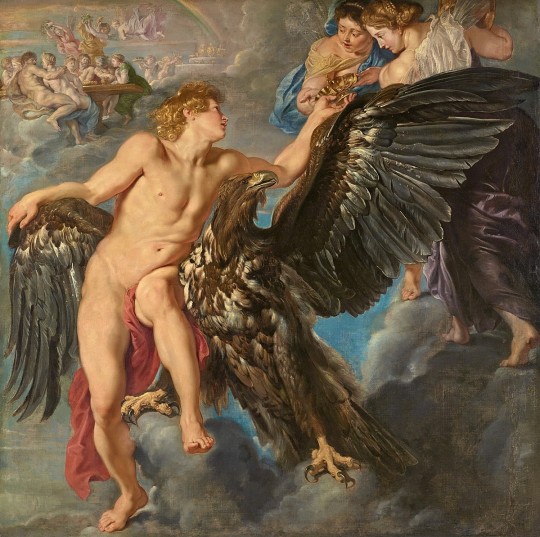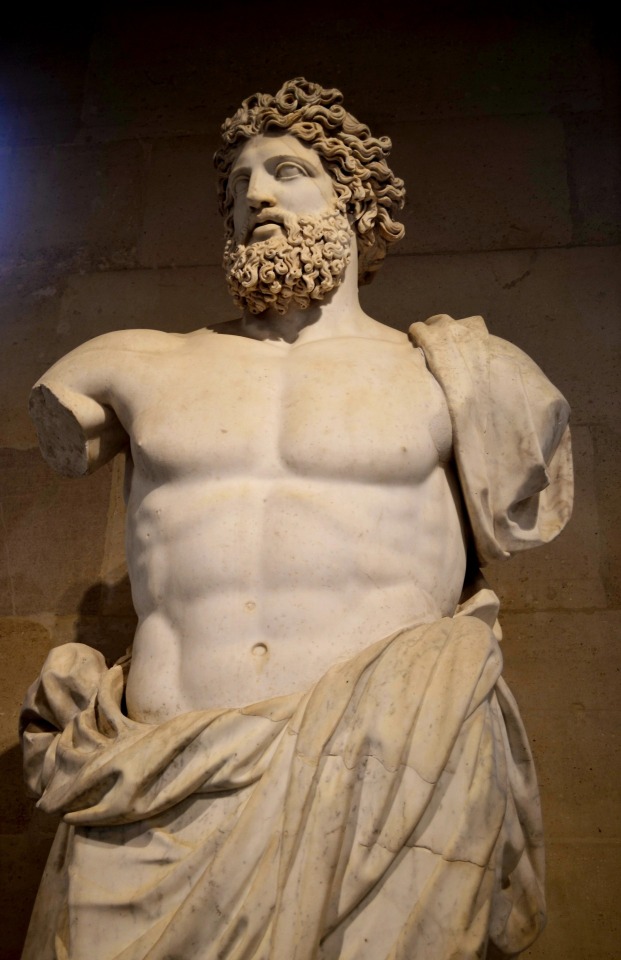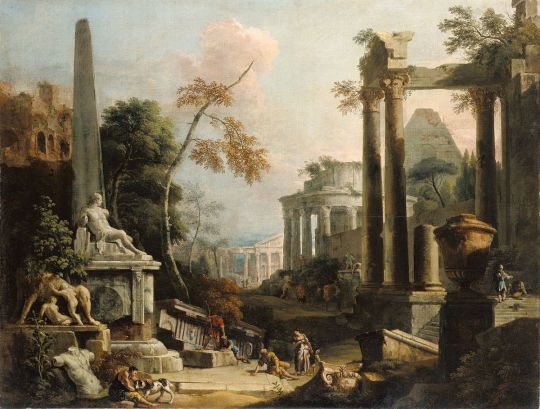#iupiter
Explore tagged Tumblr posts
Text

1612, Rubens, Ganymede receives the bowl from Hebe
#Rubens#Ganymede receives the bowl from Hebe#saec. XVII#1611#1612#pictura#Palais Schwarzenberg#Vindobonae#Ganymedes#Iupiter#Zeus
167 notes
·
View notes
Text
Iuppiter ⛈️

"O Iuppiter, who does cherish and nurture the human race, through whom we live and draw the breath of being, in whom rest the hopes and lives of all humankind, I pray You grant that this day may prosper that which I have in hand."
- Plautus Poenulus 1187-89
#religio romana#roman pagan#roman paganism#rompol#roman gods#roman pantheon#roman polytheism#roman polytheist#ancient roman religion#jupiter#iupiter#iuppiter#Jupiter god#Jupiter deity#deity worship#zeus#Iuppiter god
15 notes
·
View notes
Text
Sometimes I'd like to take my brain out of my head and kick it like a soccerball into the atmosphere to establish dominance.
0 notes
Text
Roma'nın Kökeni ve Kuruluş Mitolojisi

Roma'nın ünlü şairi Vergilius tarafından yazılan Aeneas Destanı, Roman tarihi açısından oldukça önemlidir. Bu destan, Roma şehrinin kuruluşunu ve aslında Romalıların kökenine değinir.
Bilindiği üzere Roma tanrıların çoğu Antik Yunan tanrılarıyla aynıdır, sadece birçoğunun ismi farklıdır. (Venüs - Afrodit, Athena - Minevra, Zeus - Iupiter gibi) Bu durum esinlenmekten ya da çalmaktan değil tam tersi Roma'nın kökeninin de Troya'ya dayanmasından kaynaklanır.
Aeneas Destanı'nın baş kahramanı Aeneas, Troyalı bir prensti. Harabeye dönen şehirden kaçarak Batı İtalya'da bulunan Latium'a ulaşır ve orada bir krallık kurar. Latinium Krallığı, Roma İmparatoruluğunun kurulduğu topraklarıdır ve imparatorluğun temellerini oluşturur, bu şehir imparatorluğa uzun süre başkentlik de yapmıştır.
Vergilius, Aeneas'ı tanıtırken onun annesinin tanrıça Venüs olduğunu söyler ve tanrıçanın Roma İmparatoru Augustus ile bir kan bağına sahip olduğunu da ekler. Destandaki bu detay da, Antik Yunan tanrılarının soy olarak Roma tanrıları da olduğununun göstergesidir.
Roma'nın kuruluşu ile ilgili bir diğer mit-destan ise ünlü Romalı tarihçi Livius'a aittir. Livius, miti de aslında Aeneas'a dayanır.
Antik Roma'nın aile tanrıçası olan Vesta adına ailelerin küçük kız çocuklarından seçilen ve adlarına Vesta Bakireleri denen bakirelerden Aeneas'ın soyundan gelen Rhea Silvia, savaş tanrısı Mars'ın (Yunan mitolojisinde Ares) tecavüzüne uğrar. Bu olay sonrasında ise ikiz oğulları olur. Anne, bir tecavüzün sonucu olan ikizleri, nehire bırakıp boğulmaya terk etmek zorunda kalır. Dişi bir kurt tarafından bulunup emzirilen ikizler Romulus ve Remus sonrasında bir çoban tarafından evlat edinilir. Büyüdüklerinde bir şehir kuracaklarının hayaliyle büyüyen çocuklar, bu şehre de Roma adını vereceklerini daha henüz küçükken karar vermiştir. Büyüdüklerinde ise kardeşlerden Romulus kurulan şehrin, Roma'nın ilk kralı olmuştur.
#roma#roma imparatorluğu#mit#mitoloji#antik yunan#felsefe#felsefe bilim#aeneas#livius#vergilius#tanrı#venüs
20 notes
·
View notes
Note
the winds huh, wow, I thought you'd be a bit...more, y'know?
@lightning-prince-of-gods
What do you mean by that? Aquilon, what do they mean by that?
I don't know, Sir Aeolus, ask them.
Mason, child of Iupiter and Iuno, what did you mean by that?
12 notes
·
View notes
Note
I have an odd feeling you have a favorite letter. What is it?
i say i have a favorite letter a lot as a joke, usually e or h, but my true love is j because of how new it is. julius ceaser spelt his name iulius. jupiter is cognate with zeus because it’s actually pronounced iupiter, and the iu part is shared with eu in zeus. j just has cool stuff around it
4 notes
·
View notes
Text

Jupiter / Iupiter, God of thunder and the sky
Praise be to Jupiter, King of the gods, for all that he has blessed me with. His kindness will not go unpaid and I shall praise him until my final breath. May he always be honored!
8 notes
·
View notes
Text
i had a dream last night i was watching sailor moon but the subs were in latin. i dont know latin nor have i actually finished sailor moon. i just remember reading the words "sailor iupiter" and laughing myself awake
#was gonna comment how clearly i dont know latin cause i didnt turn sailor into its latin word#but also 'sailor' in their titles is still sailor in Japanese so it might make more sense to keep it again?#...im overthinking this lol
3 notes
·
View notes
Text
Something comedic is the way some Roman polytheists have warned me about Bellona, citing her as dangerous and bloody. As if lightning of Iupiter is less deadly, or the arrows of Cupid sweet and not stinging.
Bellona is intense, yes, and she is a bloody goddess, but she is lovely all the same.
6 notes
·
View notes
Text

1782, Bénigne Gagneraux, The abduction of Ganymede
#Bénigne Gagneraux#The abduction of Ganymede#saec. XVIII#1782#pictura#Muzeum Narodowe w Warszawie#Varsoviae#Ganymedes#Iupiter#Zeus
30 notes
·
View notes
Text
*Tap, tap* ... is this on?
Now then... salutations! The name's Arubianus. Or Iupiter Arubianus. He/Him is preferred!
I am the Celtic god of skies! And also fields! Similar to Zeus. Though I don't control lightning as he does, nor have a very cool, snazzy thunder bolt.
I wish I had one. :(
But if you need your crops watered, your sky bright, want to become one of my kids or anything else, I'm the man!
When I got here, I lost a lot of my memories. I saw how Ataegina tells about her life, but I can't do that, so I shall play the saxophone for you-! 🎷🎷🎷🎷🎷🎷🎷🎷🎷🎷🎷🎷🎷🎷🎷🎷🎷🎷🎷🎷🎷🎷🎷🎷🎷🎷🎷
(This is where you clap, haha...!)
Anyway! Ahaha, this is awkward, but... my colleagues of sorts are Bedaius (best friend <3), Celeia (she's a bit scary) and Ataegina (SCARY. DO NOT APPROACH) - atleast those are the ones I remember. But I'm willing to make more acquaintances, ofcourse...
I am supposed to add on which animal stands for me. But shock of all shock, I do not remember. Haha. But I like Golden Retrievers...? Does that count?
If you have anything to ask, don't be shy! :)

OOC: RP blog for Lord Arubianus! Ask anything :) OCs and Greek deities, EPIC characters, PJO characters all welcome! Have fun! Dividers are by .strangergraphics :D
1 note
·
View note
Text


Jupiter Amon i Gorgona, Kapitolij (forum), Jader, II. st., Arheološki muzej Zadar
Jupiter je vrhovno božanstvo rimskog pantheona. Lat. naziv Iuppiter, kao i u grč. proizlazi iz indoeuropskog korjena dios- dieu= dan, nebo te italskog pater= otac; dios+pater= dispater- iupiter- iuppiter. Malo je poznato o Jupiteru prije asimilacije s grčkim Zeusom- nakon čega skoro u potpunosti poprima Zeusove kompetencije i ikonografske elemente. Izvorno- zaštitnik jasnog neba; posvečene su mu Ide- prema mjesečevom kalendaru dani punog mjeseca kada je nebo najsvjetlije; kao zaštitniku neba- hramovi na vrhovima brežuljaka; zaštitnik neba- zaštitnik usjeva i žetve, zaštitik vina; zaštitnik dane riječi i prava te „međunarodnih” odnosa.
Glava Gorgone/Meduze sastavni dio vojničke ikonografije. U rimskom razdoblju sastavni dio ikonografija javne arhitekture (trijem foruma, bazilika i sl.).
#myupload#croatia#zadar#dalmacija#forum#arheološki muzej#antique#jupiter#history of art#history#photography#city aesthetic#2012#archive
0 notes
Text

More WoD OCs!
Ino Giovanni (born in 1819), former heiress to one of the house's seats in Southern Tyrol, was embraced prematurely (1830) in order to save her from tuberculosis, upon which she immediatly fled her screwed up family, settling for a more "simple" life in a former homestead below the Capuchin Catacombs.
Iupiter Rossellini (born in 1756, embraced in 1770), a rogue relative from one of the major branches of the house, has become her adoptive brother and he continuously ensures their safety from the rest of their wicked kin by hiring only the best guards, paying them in vitae (currently they're under the protection of a Dunsirn-family-branch Black Spiral Ronin)
Surprisingly, neither Ino nor her brother are actually necromancers, with Iupiter focusing purely on his brute strength while Ino has taken to studying Thaumaturgy (Path of the Father's Vengeance) from a grimoire in their guard's possession.
1 note
·
View note
Text

Aug 2023
Der Spreebogen, ganz früh, an einem Sommermorgen. Noch ohne Touristen. Nur bißchen Polizei unterwegs, die Heimstätten der Macht zu beschützen. So schön Iupiter-Iovis-blitzmäßig spiegelt sich das Licht nur am ganz frühen Morgen in den Fenstern. Muß man sich schon in den Hintern treten und früh aufstehen.
Und da ich da die Kreuze sehe: Hab ich mich kürzlich zu hart über die armen Kokser geäußert? Natürlich sollte man niemandem wirklich in die Beine schießen! Das war doch Ironie, Mensch.
Und wer einen geliebten Menschen an Koks oder Speed verloren hat, sollte ihn natürlich nicht aufgeben. Hinter der nervtötenden Hülle steckt noch immer ein Mensch. Aber vielleicht kann man versuchen, den Patienten umzustellen? Auf Heroin oder so zum Beispiel? Irgendwas bodenständiges, ehrliches, erprobtes? Ne saubere Heroinabhängigkeit ist doch ne ganz andere Liga als die halbseidene, überteuerte Kokserei. Da hat man was handfestes, da erlebt man was, da kann man den Enkeln später schöne Geschichten erzählen. Vielleicht mal drüber nachdenken. Oder bei Lauterbach im Gesundheitsministerium anfragen, was die so empfehlen. Die raten bestimmt auch eher zum Pieks. Und zum nachfolgenden Booster, alle 8h. -- Muß ich jetzt "Ironie aus" schreiben? Ironie aus. Ganz todernst gesprochen: Je älter ich werde, desto sympathischer ist mir der nüchterne Mensch. Auch wenn ich überhaupt nix habe gegen einen Bayern mit 3 Bier drin oder einen Franzosen mit ner halben Flasche Rotwein im Kopf. Theoretisch müssten die moslemischen Mitbürger die sympathischsten sein.
1 note
·
View note
Text
2100/2101

Druhý ročník byl prapodivný.
Všichni hrozně vytáhli do výšky. Orion se najednou přestal cítit nejmladším na hradě, protože jím najednou nebyl. Nábor do famfrpálového týmu dopadl ještě lépe, než doufal; dostal se jako náhradník na post odrážeče bez sebemenších pochyb. Iupiter i Perseus na něj byli docela pyšní, i když ho významně upozorňovali, aby díky famfrpálu nepřeložil studium na druhou kolej.
Neznali ho dostatečně na to, aby věděli, že něco takového rozhodně neudělá.
V Bradavicích dělal přesně to, co se od něj čekalo. Studoval, hrál famfrpál, nepravidelně jedl, četl mudlovskou klasickou literaturu a dostal se na tempo jedné knihy za měsíc až šest týdnů, což považoval za významnou výhru nad dyslexií, která ho žere snad čím dál víc.

0 notes
Text
Ovid: Metamorphosen, 4. Buch
12. Medusa (753-803)
Dreien der Götter erhöht drei Rasenaltäre der Sieger, Dir, Mercurius, links, dir rechts, kriegskundige Jungfrau;
755 Mitten ist Iupiters Herd. Man schlachtet die Kuh der Minerva Und dem Beschwingten das Kalb, dir, höchster der Götter, den Farren. Schleunig vermählt er sich nun Andromeda ohne die Mitgift, Seinen erstrittenen Preis. Hymenaios und Amor mit Fackeln Ziehen voraus; reich nähret die Glut süßduftendes Rauchwerk;
760 Festlich mit Kränzen behängt ist das Haus, und Leier und Flöte Schallen umher und Gesang allorts, die glücklichen Zeichen Frohen Gemüts. Weit steht mit erschlossenen Flügeln geöffnet Prangend von Gold der Saal, und es treten die edlen Kephenen Ein zu dem Hochzeitsmahl, das köstlich der König bereitet.
765 Als nach beendetem Schmaus die treffliche Gabe des Bakchos Allen erheitert den Geist, fragt Lynkeus' Spross nach des Landes Art und üblichem Brauch und nach Sinn und Sitte der Männer. ……….. Der ihn dessen belehrt, sprach drauf: "Nun, tapferer Perseus,
770 Tue - wir bitten dich - kund, durch was für List und mit welcher Männlichen Tat du erlangtest das schlangenhaarige Antlitz." Drauf erzählte der Spross des Agenor, am frostigen Atlas Lieg' ein Gebiet, umschanzt vom Bollwerk felsiger Wände. Vorn im Geklüft dort hätten gewohnt zwei Schwestern, des Phorkys
775 Töchter, die in den Gebrauch des einzigen Auges sich teilten. Das nun hab' er entwandt, indem er mit schlauem Betruge Während des Wechsels die Hand hinhielt. Durch pfadlose Öde Und durch Klippen sodann, die starrten von brüchigen Wäldern, Sei er zum Sitz der Gorgonen gelangt, und auf Feldern und Wegen
780 Ringsum hab' er gesehn viel Bilder von Menschen und Tieren, Die aus belebten in Stein gewandelt der Blick der Medusa. Doch er habe geschaut im spiegelnden Erze des Schildes, Den an der Linken er trug, die Gestalt der grausen Medusa, Und weil lastender Schlaf sie selber gebannt und die Schlangen,
785 Hab' er dem Rumpf entrissen das Haupt, und der flügelbeschwingte Pegasus sei aus dem Blut der Mutter gezeugt mit dem Bruder. Auch langwieriger Fahrt nicht falsche Gefahren erzählt er, Was er von oben herab für Länder gesehen und Meere, Was für Sterne sogar er berührt mit geschwungenen Flügeln.
790 Wider Erwarten jedoch schwieg jener; und einer der Edlen Wieder beginnt und fragt, warum nur sie von den Schwestern Wechselnd mit Haaren gemischt am Haupt die Schlangen getragen. "Weil", antwortet der Gast, "du erfragst, was wert der Erzählung, Höre den Grund des, was du erfragst. Obsiegend in Schönheit
795 War der beneidete Wunsch zahlreicher Bewerber Medusa; Aber es fiel kein Teil an der ganzen Gestalt in das Auge Mehr, als das Haar. So hört' ich von manchen, die selbst es gesehen. Diese entehrt der Fürst des Meers, wie es heißt, in Minervas Tempel. Von hinnen gewandt hielt Iupiters Tochter die Aigis
800 Vor ihr keusches Gesicht, und damit nicht fehlte die Strafe, Ließ sie der Gorgo Haar sich wandeln in scheußliche Hydern." Jetzt noch immer, mit Angst zu schlagen erbebende Feinde, Trägt sie vorn auf der Brust von ihr selber geschaffene Schlangen.
0 notes